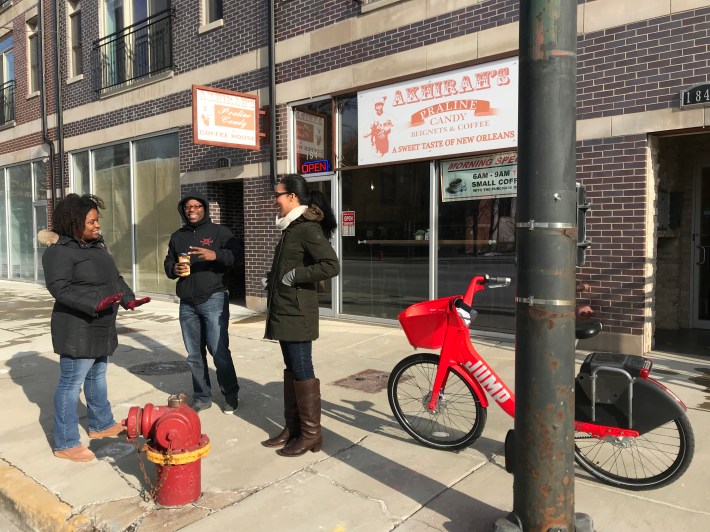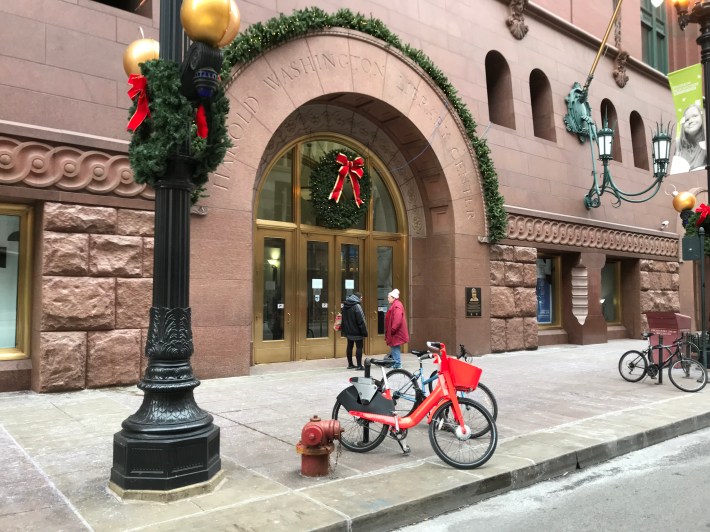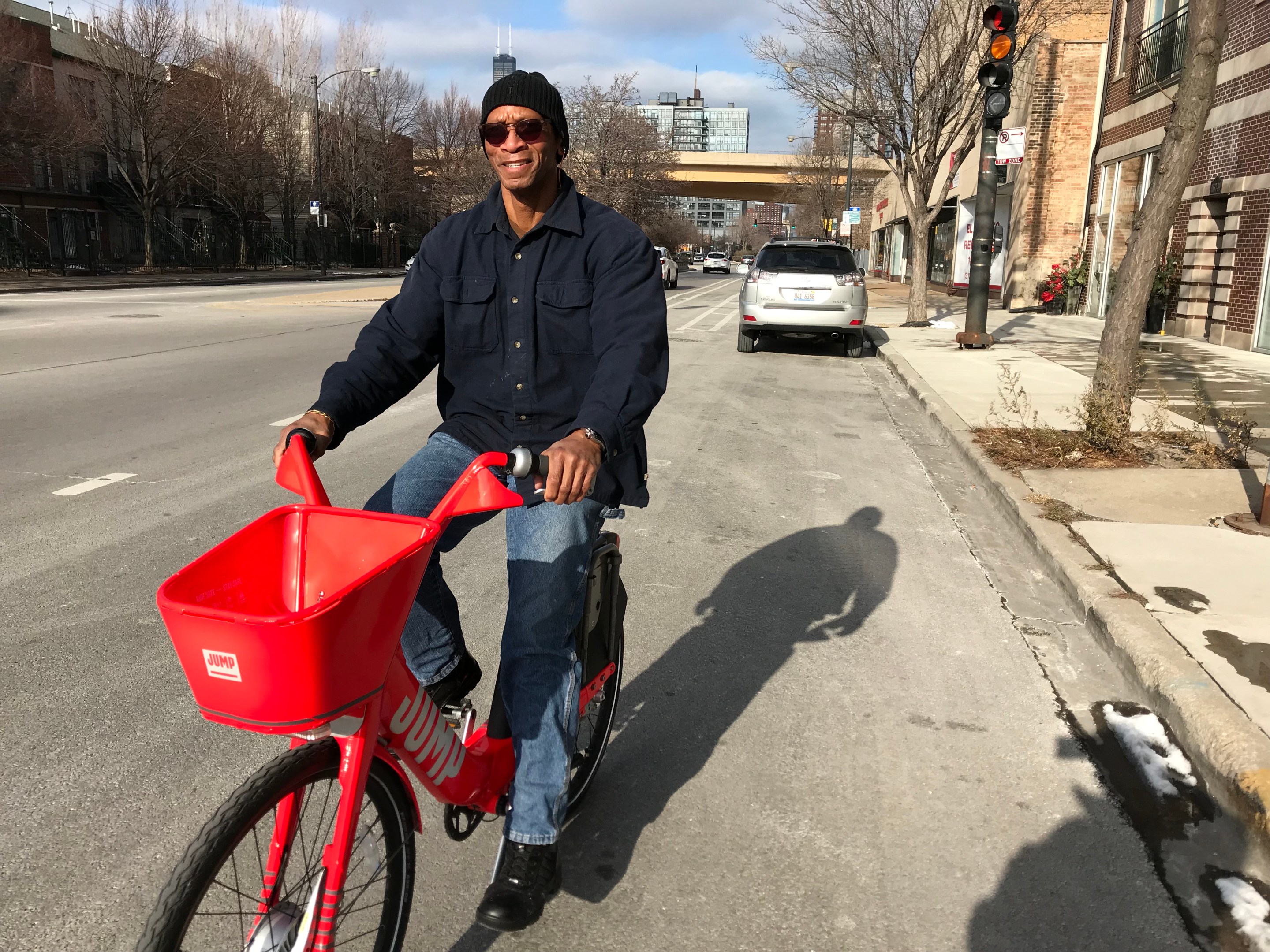As city officials consider whether and how to let dockless bike-share operators set up shop Chicago, residents are already getting a chance to experience this new technology thanks to the new mobility justice group Equiticity’s efforts to set up “bike libraries” on the South and West sides.
The group, started last month by Slow Roll Chicago cofounder Oboi Reed, is partnering on the project with We Keep You Rollin’ a bike group in the Riverdale community area (which includes Altgeld Gardens, Golden Gate and other enclaves), and several community groups in North Lawndale. The Beijing-based dockless bike-share company Ofo has promised to donate at least 100 cycles, possibly as many as 300, for the Riverdale library, and Jump Mobility, an electrical-assist dockless bike purveyor from New York, has pledged 100 cycles for the North Lawndale library. Both libraries are slated to officially launch in early April.
Ofo recently delivered 14 bikes to We Keep You Rollin’ and Reed is managing a fleet of five Jump cycles. The bikes are currently available as short-term loaners for anybody who’s interested in trying them out, with a focus on stakeholders in Riverdale and North Lawndale, which are both low-to-moderate-income (LMI) African-American communities. Unlike dockless bikes that are left locked out on the public way so that anyone who downloads an app can rent them, this informal, free loaner system doesn’t seem to require city permits.
I caught up with Reed last weekend at Akhira’s Praline Candy & Coffee House, 1845 South State (try the beignets!) to discuss the bike library project and to test ride one of the Jump bikes myself. The shiny, red bikes with full baskets attracted plenty of attention, and a few people at the café even took them for a spin. Reed proved himself to be an enthusiastic advocate for dockless bike (DoBi) technology, arguing that “the future of mobility is smart, GPS-enabled, dockless bikes, including electrical-assist bikes.”

“We know that car culture is not sustainable in terms of health the environment, and the way we utilize space,” Reed added. “Bikes are part of our toolkit to improve cities, especially for those who are the most marginalized: LMI people of color. In neighborhoods where there is no bike culture, where there are worries that bike infrastructure is a precursor to gentrification, or where violence – interpersonal, police, vehicular – makes people not want to ride, we should be doing everything possible to get people to ride.”
Reed argued that DoBi cycles are particularly well-suited to be a gateway to biking in African-American and Latino communities. “The yellow Ofo bikes are some nice looking bikes, and the these bright red Jump bikes are beautiful,” he said. “People in our neighborhoods, we want a nice-looking bike and we want to look fly, we want to look fresh when we’re riding though the neighborhood. You get on a bike like that and everybody’s watching and looking – that’s the experience we want to bring. We want to provide a cultural experience that connects with people’s identities and their sense of style and expression.”
While the service area for Divvy, Chicago’s popular traditional bike-share system, covers more than half of the city’s area, stations are spaced father apart in neighborhoods with a lower density of fewer people and destinations, which makes the system less convenient to use. Moreover, more than four years after the network launched, many outlying communities, including several Black and Brown neighborhoods, still don’t have stations, and federal funding for expanding the system may be hard to come by under the current administration.
Reed says DoBi, which is typically funded by venture capital, can be a solution to that problem. “With dockless bikes we’re not limited to stations and we’re not limited by when the city and Divvy want to make an investment in our neighborhoods. We don’t have to wait -- companies are willing to bring the bikes today.”

Reed thinks electrical-assist bikes like Jump’s can be especially beneficial to build interest in cycling in communities of color. “Electrical-assist is a cool new feature that’s a way to engage people,” he said. “It’s like the way people people are always clamoring to get the new iPhone – it’s those new features that get people excited.”
He adds that African-American and Latino communities are disproportionately impacted by diabetes, heart disease, and some forms of cancer, so new opportunities for physical activity can be especially beneficial for these neighborhoods. However, some residents may not feel that they’re fit enough to ride a bike. “If people who aren’t in the physical condition to ride a regular bike, or don’t believe they are, are willing to try an electrical-assist because it’s a little easier, I want to get them on that bike. I also want to work with them to transition to bikes that provide more physical activity, but I see this as a nice starting point.”
Reed added that electrical-assist bikes can be particularly useful on the South and West sides. Density is lower in these areas due to the presence of industrial areas, and the legacy of disinvestment in communities of color means that job commutes are longer, and food and retail deserts are a major issue. “If an electrical-assist bike reduces the amount of time to get to work from 40 minutes to 30, that’s going to make biking a more practical option,” he said. “Electrical-assist bikes are a gateway to cycling that I want to introduce.”
I was an e-bike skeptic myself, until my 81-year-old father recently added an electrical-assist motor to his bicycle, which gave his daily cycling habit a second wind. No longer discouraged by the hills in our hometown, he’s probably putting in more miles and getting more physical activity than he has in years.

And I'll admit that when I borrowed a Jump bike from Reed, the extra speed that comes from the electrical assist was a thrilling experience. It felt kind of like riding on a motor scooter, but with fewer carbon emissions. On a Jump cycles, each pedal stroke is rewarded with a burst of juice, which made it easy to maintain a cruising speed over 15 mph, compared to my usual 10 mph standard.
It’s also worth noting that these bikes are the only DoBi cycles I’ve heard about with a built in U-lock that allows you to secure the vehicle to a fixed object, like a bike rack. That helps address issues of street clutter, theft, and vandalism associated with dockless brands that only include wheel locks for “free-locking” the bike to itself.
Still, I’m probably more of an acoustic bicycle kind of guy. I felt a little guilty as I pulled up on Divvy riders with my electrical advantage, so I made a point of not passing them. I also felt like I was getting about half the exercise of riding a standard bike.
If you borrow a Jump bike from Reed this winter, be sure to dress warm – less pedaling means less body heat, and the high speeds generate extra wind chill. On the other hand, less sweat and a cool breeze would be welcome during a sweltering Chicago summer.
And despite my personal preference to do all the pedaling work myself, I agree with Reed that dockless e-bikes are a great strategy for getting new people excited about cycling. In addition, having residents test ride the Ofo and Jump bikes on city streets will give us a better idea if DoBi is a good fit for Chicago.




